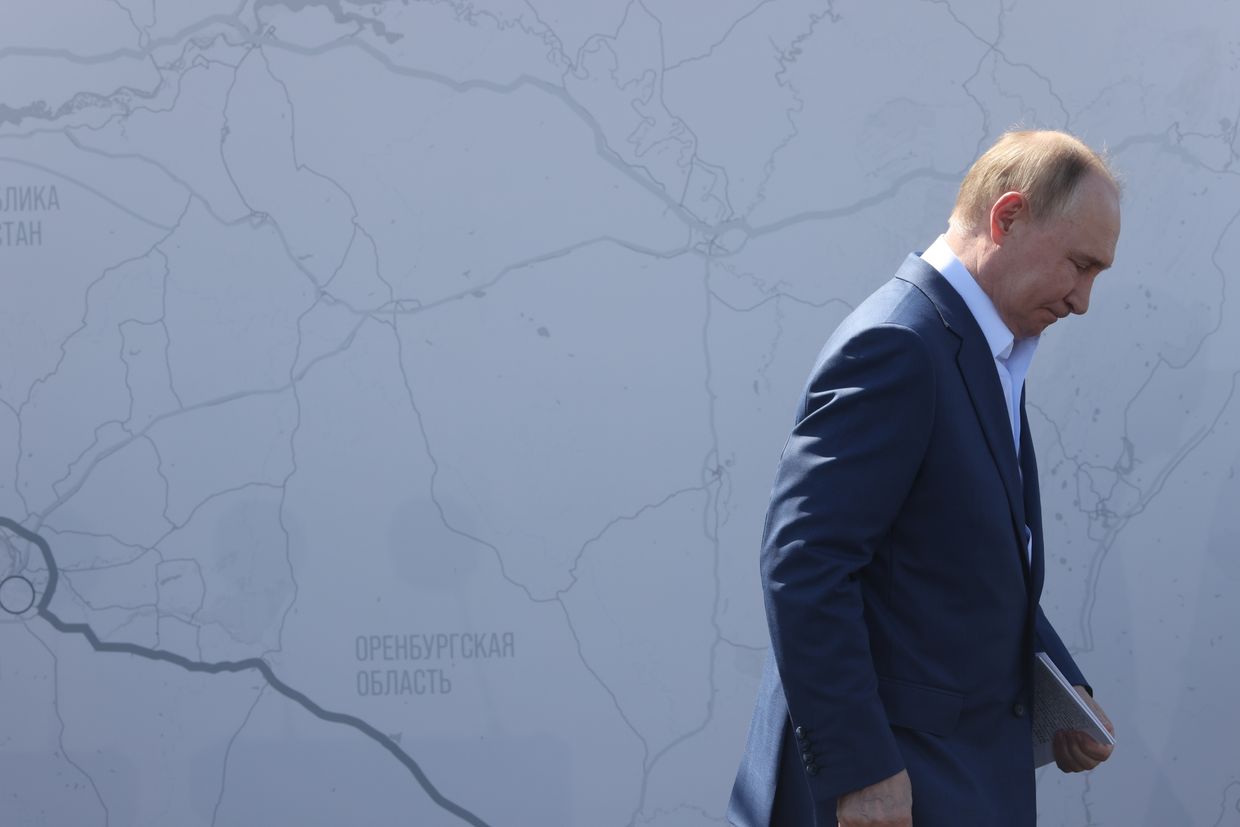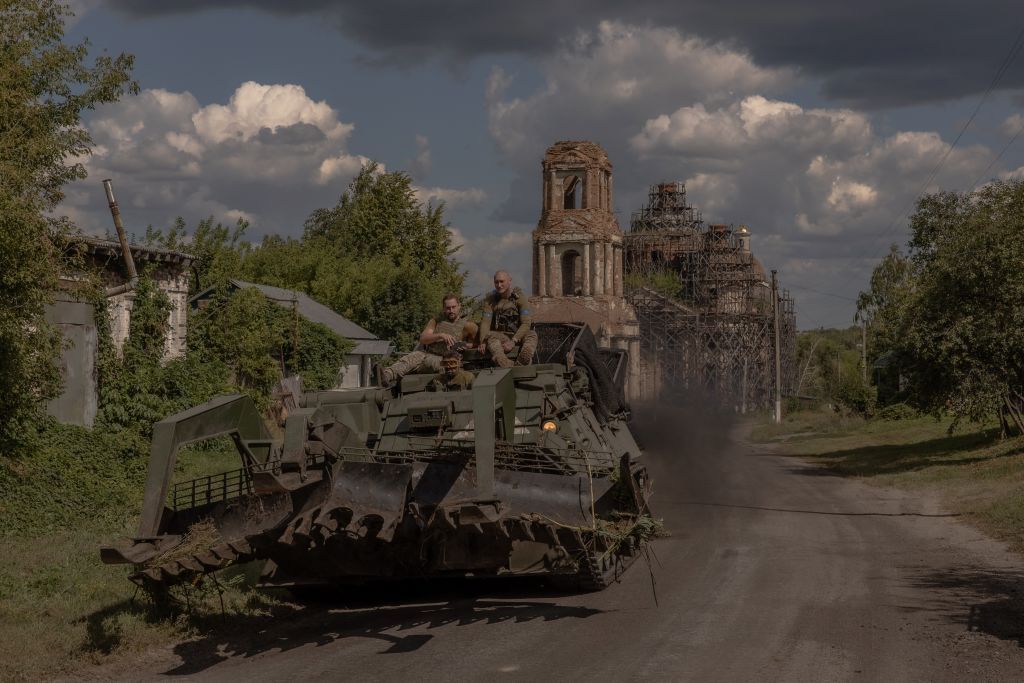How Ukraine's Kursk incursion threw Russia's top propagandists into crisis

Russian President Vladimir Putin (C) chairs a meeting regarding the situation in Kursk Oblast, in his residence in Novo-Ogaryovo outside Moscow, on Aug. 12, 2024. (Gavriil Grigorov/POOL/AFP via Getty Images)
Margarita Simonyan, one of Russia's foremost propagandists, has gone AWOL.
"She's vanished from view," Julia Davis, creator of the Russian Media Monitor, told the Kyiv Independent, adding: "She's barely posting on social media and she's not appearing on state TV."
"That's probably because they haven't come up with a good set of talking points that would make any sense, because this situation has really exposed the reality of what is happening in the war they started."
That "situation" is Ukraine's ongoing incursion into Russia's Kursk Oblast, and "they" are the Kremlin and the Russian state media channels that have been flung into crisis mode as a result.
When Ukrainian forces crossed the Russian border on Aug. 6, Russia's immediate response was to downplay the incursion.
In its first statement reported by state media, Russia’s Defense Ministry said that the attack was being repelled and that Russian reserves had been sent to the border in Kursk Oblast.
Later, the ministry said it was "another attempt to break through into Kursk Oblast."
Posting on Telegram, Russia's pro-war semi-independent propagandists often known as "milbloggers" also dismissed the significance of the incursion, with one of the most well-known, Rybar Z calling it "a PR- campaign" to stretch Russian troops.
The Russian Defense Ministry continued to play down the incursion, and said on Aug. 7 that Moscow has prevented Ukrainian forces from advancing deep into Russian territory, adding that they "continue to destroy the enemy."
In a televised meeting, Russian President Vladimir Putin called the invasion a "large-scale provocation" and met with top Russian officials.
Valery Gerasimov, chief of the General Staff of the Russian army, told Putin that Ukrainian soldiers allegedly aimed to "seize" the territory of the Sudzhansky district, but their "advance in the Kursk direction was halted."
By this stage, the narrative being pushed by the Kremlin and Russian state media were beginning to diverge from that of the milbloggers – Rybar Z said that the situation in Kursk Oblast "continues to deteriorate."
On prime time state TV, cracks were beginning to show. During the show 60 Minutes on Aug. 8, host Olga Skabeeva listened stone-faced as a war correspondent on a video call from Kursk Oblast said it would be wrong to describe the incursion as "an attack of a sabotage and reconnaissance group."
"This is a fully-fledged combined arms invasion," the correspondent said.
"They were trying to portray it at first as just some saboteurs that were just knocking on their territory but that was very quickly overtaken by almost panicked reactions that they had been invaded," Davis said.
As Ukraine continued to make advances over the next few days, Russia continued to try to downplay the incursion.
As Ukrainian troops published video from the outskirts of Sudzha on Aug. 9, Russia's RT outlet was reporting Russian Defense Ministry statements that Moscow's forces had "stopped attempts by the Ukrainian Armed Forces to conduct raids deep into the Kursk Oblast."
On Aug. 10, Moscow was forced to announce a "counterterrorism operation" not only there, but also Belgorod and Bryansk oblasts as the incursion continued to escalate.
Yet in comments reported by RT, Russian Akhmat Regiment commander Apti Alaudinov said that Russian forces "took the situation in Kursk Oblast under control."
To support the claims, the Russian Defense Ministry pumped out videos of Moscow's troops destroying Ukrainian troops and materiel.
One published by Russian state outlet RIA Novosti claimed to show Russian helicopters striking Ukrainian personnel and armored vehicles in Kursk Oblast with S-13 airborne missiles.
But an investigation by the Russian independent news outlet the Insider on Aug. 10 found this and other similar videos were filmed weeks earlier in areas of the front line in Ukraine and had nothing to do with the fighting in Kursk Oblast.
By this stage, even Russia's top propagandists were struggling to make the narrative they were pushing square up with what they were seeing from Kursk.
"It was almost comical when host Olga Skabeeva was confused because (the Russian military) said it was about a thousand men from the Ukrainian side that invaded, then they were claiming that they killed almost a thousand of them," Davis said.
"Even she was confused by the Kremlin math in this instance."

On Russian state TV on Aug. 11, the widely-watched Evening with Vladimir Solovyov saw its host – better known for lauding the "righteous" full-scale invasion of Ukraine and passionately calling for nuclear strikes on various countries – somberly acknowledging the scale of the situation in Kursk Oblast.
"Of course the main news this week, so to speak, is a worrisome one. An attack on Kursk," he said.
"It should be approached with the utmost seriousness. What we're witnessing is an unprecedented escalation."
By Aug. 12, the game was up and in a televised meeting with government officials, Putin was told that Ukraine controlled 28 settlements in the region, claiming that the incursion was up to 12 kilometers deep along a 40-kilometer front.
Kremlin propagandists were now in the uncomfortable situation of having to report things they have spent more than two years telling their audience could never happen.
"It contradicts everything that they've been telling their own population about their supposedly mighty army and how well they're all protected,” Davis said.
On Aug. 14, Russian authorities declared a state of emergency in Belgorod Oblast as Ukraine's incursion showed no signs of letting up.
Ukraine's TSN news program showed Ukrainian soldiers removing the Russian flag in the town of Sudzha in Kursk Oblast, the first TV reporting from the embattled Russian region.
According to Davis, Simonyan's absence from TV screens and the somber and refrained tone from other hosts represents an information vacuum in Russia's normally slick propaganda machine that usually excels at parroting lines from the Kremlin in unison.
"I can see that some of these propagandists are almost afraid to speak and to say too much because they've not been given clear talking points just yet," she said.
"They're afraid to say something which might not line up with what they will later be told to sell to the people."












